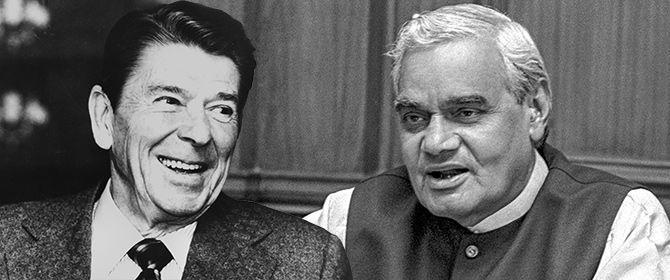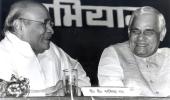The two leaders had some firm convictions in defence matters and are idolised by their respective people because they salved the scarred collective psyches of their societies, says Shreekant Sambrani.

When they started their political journeys, they were rank outsiders. The odds of their becoming leaders of their national governments were astronomical. Yet that is what they became. And they were among the most popular ones in modern times at that.
The tenth prime minister of India, Atal Bihari Vajpayee, and the fortieth president of the United States of America, Ronald Wilson Reagan, were two of a kind. They both lived to the ripe old age of 93 and spent their last years lost to the world, in the labyrinths of their own consciousness, their sonorous voices forever muted.
Vajpayee entered Parliament in 1957 and drew attention as a good and conscientious member. Despite being opposed to the Congress, he paid a most moving tribute to Jawaharlal Nehru on his death in 1964.
His party, the Bharatiya Jana Sangh, was a fringe component of the small and splintered opposition then. It remained so for most of the next two decades, until 1977, when it played a key role in the post-Emergency victory of the Janata grouping. Vajpayee became the external affairs minister in the Morarji Desai cabinet.
Many firsts such as a visit to China notwithstanding, this phase of his career was not particularly remarkable. The zenith of his career was his prime ministership as the head of the first National Democratic Alliance from 1998 to 2004.
Reagan nursed political ambitions after his Hollywood career (never an A-list star) since the 1950s. He was a great admirer of Franklin Roosevelt but became a Republican in the 1960s. He served as governor of California between 1967 and 1975 with a lacklustre record.
His bids for the Republican nomination for president were unsuccessful first against Richard Nixon in 1968 and then against President Gerald Ford in 1976. He went on to unseat Jimmy Carter in a landslide win in 1980 not so much because of his own appeal but more because America was reeling under the ineffectiveness of Carter in resolving the long-running Iran hostage crisis.
Both men had to cohabit in power with their immediate competitors in their own parties. Vajpayee and Lal Krishna Advani may have formed a long partnership, but it was not smooth sailing always. Reagan had to accept George H W Bush as his vice-president. The two had fought a bitter primary battle for the nomination in 1980, with Bush repeatedly pouncing on Reagan’s supposed naiveté. He called Reagan’s economic agenda voodoo economics.
Power seems to have made the fabled communication abilities of Vajpayee and Reagan bloom. Their good looks and powerful speech were the gifts ideally suited for the electronic media and they exploited these talents fully. They had some firm convictions in the defence matters.
Vajpayee famously conducted the Pokhran nuclear tests and Reagan pursued his strategic defence initiative, dubbed star wars, even as he prepared for the strategic arms limitations treaty with the then Union of Soviet Socialist Republic. Vajpayee enjoyed his moments of supreme glory with the Kargil campaign of 1999, while the apogee of Reagan coincided with what he called the collapse of the evil empire (East Europe Soviet bloc) towards the end of his term.
Although not known for their economic expertise, they both achieved some success in this area as well. After initial hiccups, the reform process gathered steam in India and by 2004, the economy was trotting along with an eight-plus per cent annual growth. Reagan’s supply-side economics began to show results in the late 1980s. They had failures too, but none stuck to them, earning them the epithet of Teflon leaders.
The British historian M J Heale summed up Reagan’s contribution thus: “He rehabilitated conservatism, turned the nation to the right, practised a considerably pragmatic conservatism that balanced ideology and the constraints of politics, revived faith in the presidency and in American exceptionalism.”
The consensus of the many analyses of Vajpayee in the last few days appears to be pretty much the same.
The ultimate similarity between the two patriarchs is a twist of irony. They were idolised by their respective people because they salved the scarred collective psyches of their societies.
Their own parties govern their respective nations now, but their successors are widely seen as further polarising their countries.
Perhaps it was just as well that in their final days, these avuncular leaders were beyond the pale of cognition of these widening chasms.
Shreekant Sambrani is an economist.











